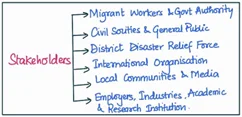Answer:
| Approach:
Introduction:
- Shortly analyse the case study.
Body
- Ethical issues in the migrant crisis
- Ethical caregiving state
- Assistance from civil society
Conclusion
|
Introduction:
The case study highlights the challenges faced by migrant workers during the pandemic-induced lockdown. It raises ethical concerns related to the rights of migrant workers, their dignity, equitable access to resources, humanitarian responsibility, and vulnerability to exploitation.

Body:
Ethical issues in the migrant crisis:
- Right to Livelihood: The sudden loss of livelihood for migrant workers raised ethical concerns regarding their right to earn a living and support their families.
- Right to Dignity: Migrant workers faced challenges related to basic needs such as food, shelter, and healthcare, which raised ethical issues concerning their right to live with dignity.
- Equity and Justice: The unequal distribution of resources and assistance during the crisis raised ethical questions about fairness and justice for migrant workers who were already marginalized.
- Humanitarian Responsibility: The lack of timely and adequate response from some districts in providing essential support to migrants highlighted ethical concerns about the duty to protect and assist vulnerable populations in times of crisis.
- Exploitation and Vulnerability: The plight of migrant workers revealed ethical issues related to their vulnerability to exploitation, unsafe working conditions, and lack of social security.
Ethical caregiving state:
An ethical caregiving state refers to a government that recognizes its moral responsibility to provide care and support to its citizens, especially during times of crisis. It involves ensuring the well-being, dignity, and protection of all individuals, particularly the most vulnerable members of society.
Assistance from civil society:
- Providing Basic Needs: Civil society organizations can contribute by providing food, water, and shelter to migrants, addressing their immediate needs.
- Medical Support: Offering healthcare facilities and medical assistance to migrants, including access to doctors, medicines, and emergency services.
- Legal Aid and Advocacy: Assisting migrants with legal support, ensuring their rights are protected, and advocating for their fair treatment and inclusion in government policies and programs.
- Emotional Support: Offering counseling services and emotional support to migrants, addressing their trauma and mental health concerns.
- Skill Development and Employment: Assisting migrants in acquiring new skills, connecting them with employment opportunities, and facilitating their reintegration into the workforce.
Conclusion:
These efforts by civil society can help mitigate the sufferings of migrants, address their immediate needs, and work towards long-term solutions for their well-being and inclusion in society.
